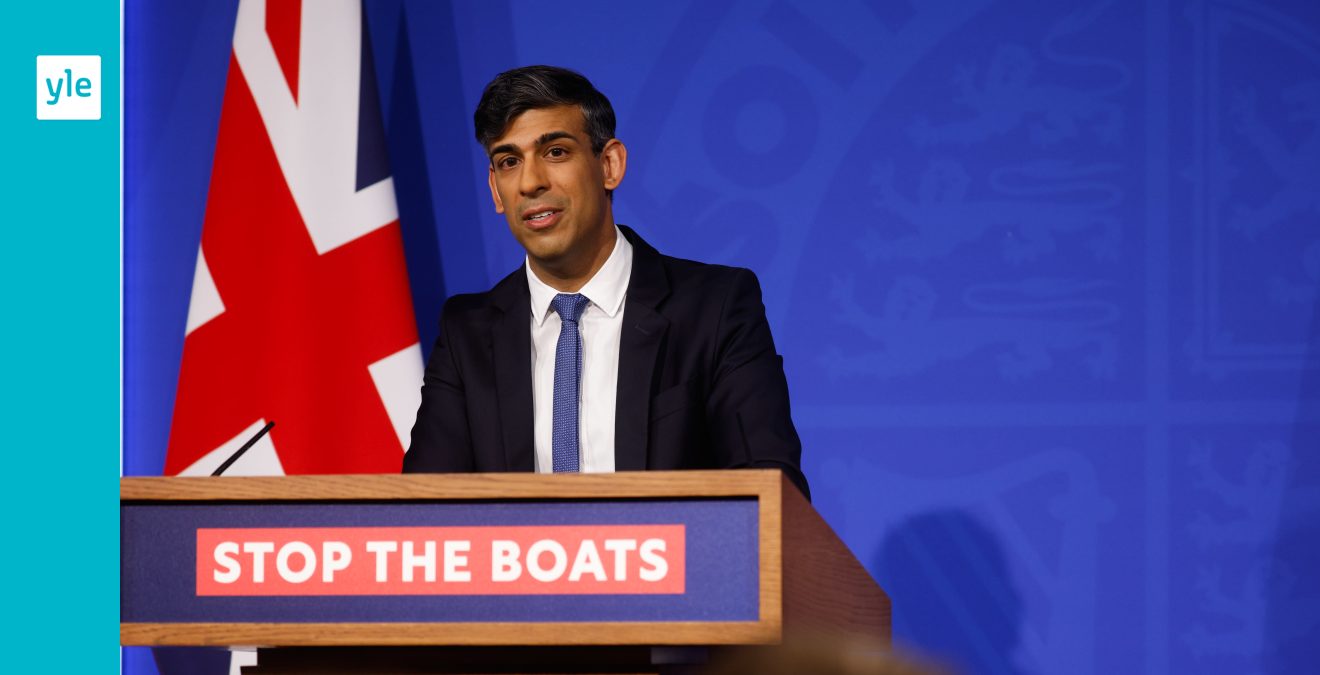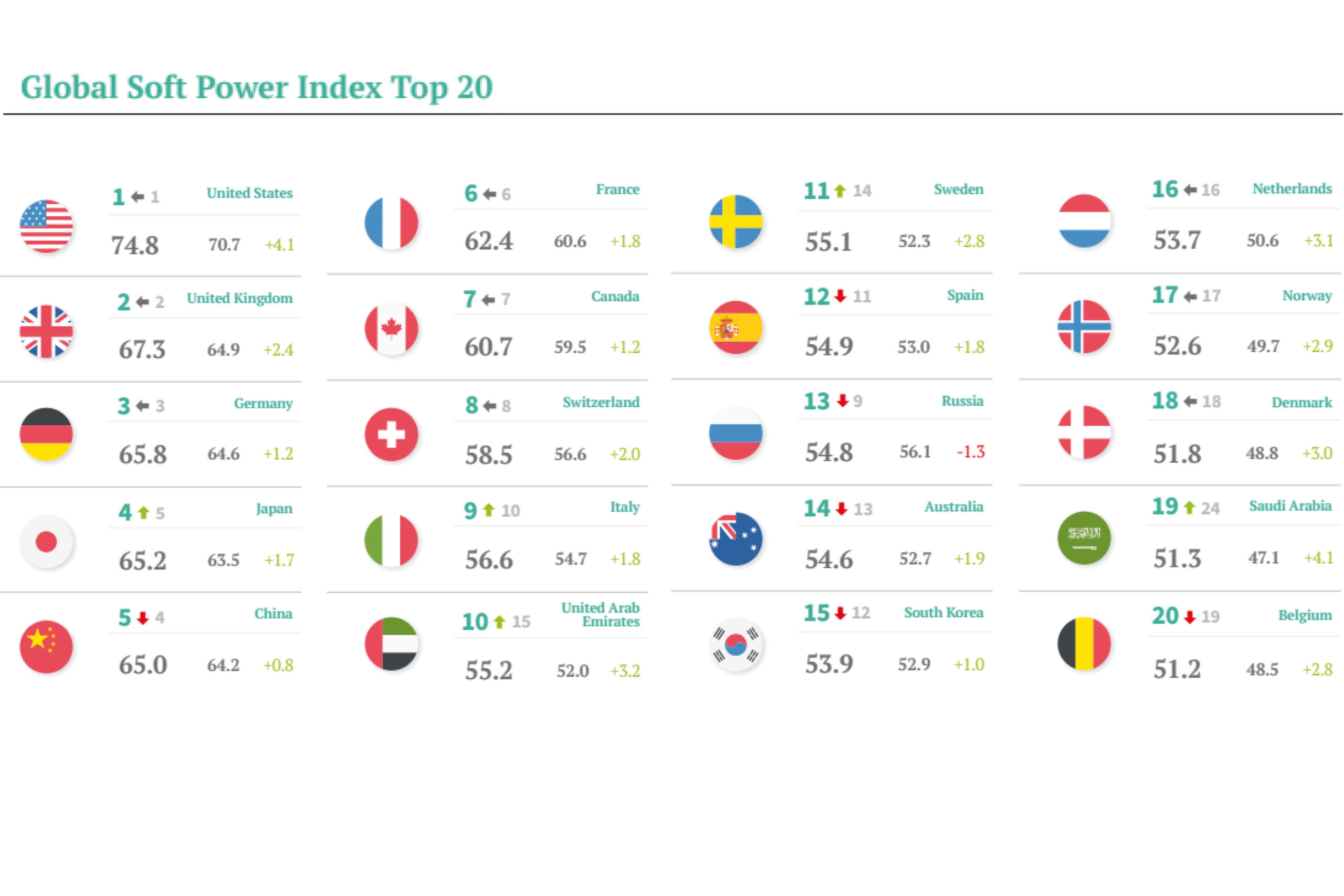How a country is viewed is of great importance to relations with other countries and the country’s ability to attract tourism, trade, investment, and international talent. A positive perception of a country also affects a country’s soft power, i.e. the ability to exert international influence.
This year, Sweden ranks 11th out of 121 countries in the Global Soft Power Index. An improvement of three places compared to 2022. The United States ranked very high, followed by Great Britain and Germany, indicating that Sweden has a strong brand as a country. Sweden ranks sixth in the “Reputation” category. Sweden’s good reputation depends on how Swedish society and Sweden’s actions are understood internationally by audiences in other countries. Sweden’s best position is in the area of a sustainable future, where we rank third. Only Germany and Japan have better locations. Sweden also has a very strong position in social governance, among other things, ranking sixth.
However, the Global Soft Power Index does not only indicate opportunities for Sweden. Awareness is generally relatively low and Sweden’s international influence is seen as limited. It can be a challenge in an increasingly competitive world where more and more countries can offer interesting solutions globally.
The importance of soft power
Last year was marked largely by Russia’s invasion of Ukraine, an example of hard power that also shows how nations’ actions can damage their reputations. In the Global Soft Power Index, Russia now ranks 105th out of 121 countries in the reputation category, down from 23rd. Ukraine and Poland, which clearly supported Ukraine, have become famous and their influence has clearly increased. However, as in the previous year, the United States is considered to have the greatest global influence, followed by China and Great Britain. Russia and Germany are also among the top five countries in terms of potential for influence. They are all large countries with a high capacity to exercise both hard and soft power.
This year’s survey also shows that many Gulf countries have better reputations than before. Their influence is also considered to have increased. For the first time, the UAE is among the top ten countries and awareness of Qatar has increased. Despite the controversy surrounding the World Cup, Qatar’s influence has also been strengthened. According to Brand Finance, the results of the Gulf countries can be explained by strategic and focused work with international events such as Expo 2020 Dubai and the FIFA World Cup. Saudi Arabia is also ranked higher than before and is among the top 20 countries for the first time. This may be due to the fact that the country, through its oil resources, was able to contribute energy at a difficult time.
Many Asian countries are growth markets, which are advanced in technological development. It has had an impact in trade and investment, with many countries from Asia ranking first. The United States of America ranks first, but Japan comes in second, China in third, and South Korea in ninth. Singapore also ranks first at twelfth. Countries like Germany, Switzerland, Great Britain, France and Sweden rank in the top ten. . However, the Global Soft Power Index shows that European and Western countries are more prominent in other regions, dominating the top positions.
Social governance, values and sustainability are strengths for Sweden and the West
In a world marked by the decline of democracy and persistent climate challenges, the Global Soft Power Index suggests that Western countries, including Sweden, are seen as responsible for the solutions. The USA, Canada, Germany, Switzerland, Sweden, Norway, Finland, and Denmark are among the countries that rank first in Social Governance, People, Values, and a Sustainable Future. Only one Gulf country, the United Arab Emirates, is among the top ten in the field of international relations. And Asian countries don’t end up here, with occasional exceptions. Japan is the only Asian country among the top ten in social governance, as well as international relations, with China also being one of the highest. Japan is also the only country outside of Europe, the USA and Canada with an advanced position in the sustainable future as the second highest ranking country.
Sweden is strongly seen as within a sustainable future, which is in line with the fact that sustainability has long been a priority for Sweden. Sustainability is also one of the areas in which Sweden performs well according to European and global surveys. Only Germany and Japan rank higher. Sweden’s second strongest area in the survey is ‘People and Values’, with the country ranking fourth. Sweden is reliable, tolerant, inclusive, and generous. Social governance is also usually a strength for Sweden, something confirmed in this year’s Global Soft Power Index. Sweden is largely considered politically stable, well-governed, and safe, ranking sixth out of 121 countries. A position that is stable over time.
However, the relatively low knowledge of Sweden presents a challenge. Over the past year, Sweden has received a lot of media attention, not least in connection with the NATO operation. However, it does not seem to have affected the knowledge of our country on a general level. Sweden ranks 21st, which is lower than in 2022. In neighboring Nordic countries, awareness of Sweden is very high, but in the United States and China, for example, Sweden ranks 20th and 23rd, respectively. In the Nordic countries, the view of Sweden is very positive and people also consider Sweden to have a great global influence. Globally, Sweden ranks 24th out of 121 countries. Although it ranks relatively high, there is untapped potential. Given Sweden’s very good reputation as a starting point, increased awareness can contribute in the long term to increasing Sweden’s influence in areas important from a global perspective.
about scanning
The Global Soft Power Index is implemented by Brand Finance and measures several factors that work together to determine how a country’s brand is perceived compared to other countries. The survey covers several factors, including the viewpoint of business climate, culture (including attractive lifestyle), governance, international relations (including thinking about sustainability), media climate, education system, and people’s values (including reliability and tolerance). and generosity). The study also covers how countries are seen to address future sustainability challenges. The online survey was conducted in 101 countries by the end of 2022 and is based on the opinions of more than 100,000 people in 121 countries. The study is based on two types of grouping. Partly an online survey among online based boards, and partly in countries where access to established boards is a newer method, which involves buying advertising space via digital marketing services.

“Extreme tv maven. Beer fanatic. Friendly bacon fan. Communicator. Wannabe travel expert.”







More Stories
Azerbaijan is in a multi-billion dollar mess with bribes
Which side does the government stand on bank fraud?
Qvantum has won the British Award for Heat Pump for Apartments